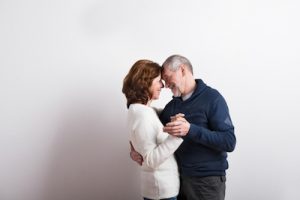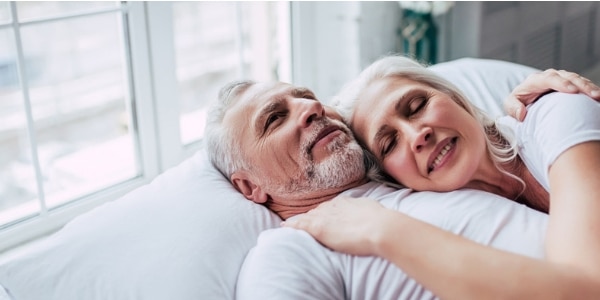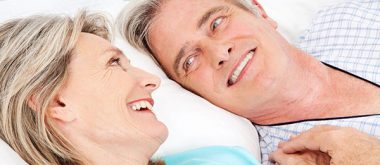Many people assume that as they age, their sex drive will inevitably drop. After all, that’s how Hollywood portrays it. However, that may not be the whole story.
This belief can be frustrating for people who already have a sex drive that is low, especially if they have a partner whose sex drive is higher. However, the thought might also be alarming for anyone with a high libido who defines their self as a sexual person. Other people might resign themselves to having a disappointing sex life or no sex life at all with aging. Nevertheless, it isn’t a guarantee that sex drive will plummet with age, and some people enjoy the freedom that comes with having a high sex drive without the risk of pregnancy.
Does Aging Really Mean Lower Sex Drive?
The idea that sex drives will decrease as you age has to do with how hormones shift. Typically, hormones such as testosterone in men and estrogen in women (although, everyone has a mixture of both hormones) drop as we reach middle age and beyond. This can be brought on earlier by the removal of glands that deal with hormones.
For example, a complete hysterectomy that removes not just the uterus and ovaries can result in what is known as surgical menopause, leading to the same side effects of natural menopause as the body adjusts to different hormone levels. Men experience their own symptoms as hormones change, along with decreased libido; erection dysfunction is also common.
It’s true that those hormones do so much more than bolster sex drive, which is why lower sex drive might accompany other side effects such as moodiness or night sweats as a result of hormones lost due to aging. However, studies have found conflicting results regarding whether sex drive drops with age and how much it does. Furthermore, research hasn’t conclusively found that simply replacing those hormones will return libido to earlier levels without other treatments, especially when it comes to prescribing testosterone to women.
This could be due to the fact that other hormones are at play. Dehydroepiandrosterone, also known as DHEA, impacts sex drive in addition to inflammation, weight, and bone density. It peaks around age 30 before starting its decline. Along with a drop in other hormones, decreased DHEA could mean a lower sex drive.
Other Things that May Impact Sex Drive

For those who experience a lack of sex drive as they age, it can be frustrating, especially if they don’t know where to find answers. Sometimes it’s difficult to bring up your sexual difficulties with a doctor. Doctors may not immediately think to ask about sexual problems or mention sexual side effects that aging or other conditions might cause. Because general doctors may overlook or may not be educated about sex problems, they may fail to connect the dots to find an explanation.
Overall
This leads many to search for answers on their own. Fortunately, some issues can be resolved. For example, women who have trouble getting wet, which can cause pain, can apply a lubricant immediately before sexual activity and reapply as needed. Vaginal moisturizers serve to increase natural moisture all the time and not just during sex.
Still, when low sex drive is directly connected to hormone decreases and aging, it can still require a comprehensive treatment plan beyond simply buying a bottle of lube, which is why it’s so important for people to advocate for themselves when they speak to their doctors, even if it’s hard. It’s not just sex. It’s part of your life, and you deserve to enjoy it at any age.





